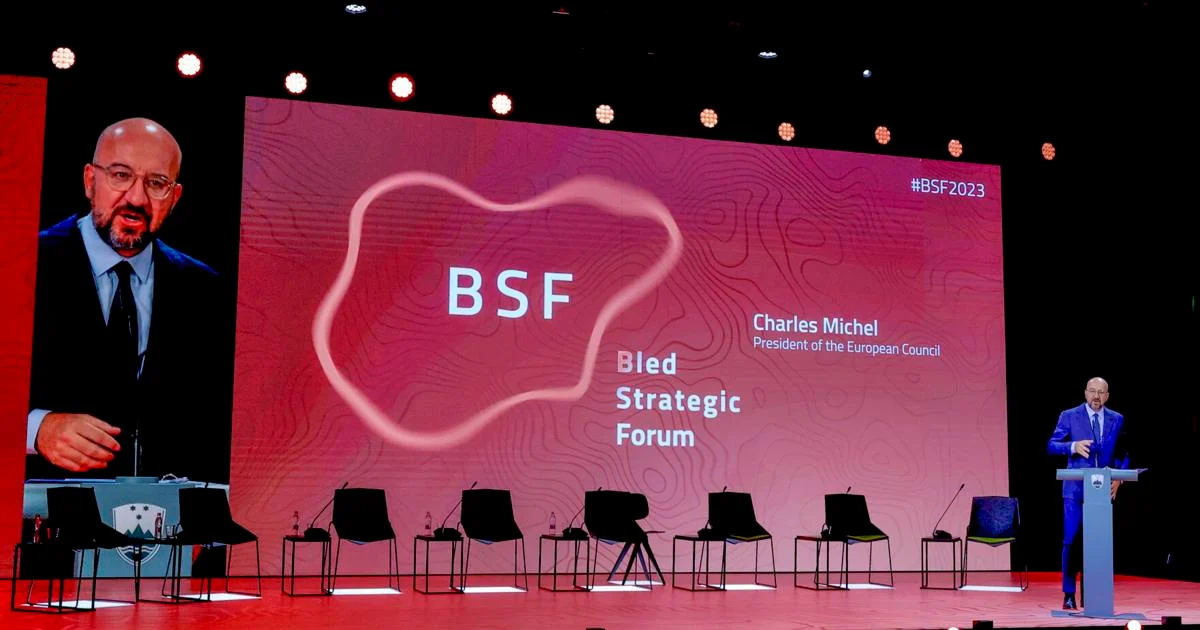This year’s Bled Strategic Forum was held in Slovenia on August 28-29 under the slogan “Solidarity for Global Security”. The leaders of the Balkan countries, which have already become EU members, and the prime ministers and top diplomats of the Western Balkans Six took part in the event. Among the participants were the prime ministers of Slovenia, Croatia, and Bulgaria, President of the European Council Charles Michel and EU Special Representative to the Western Balkans Miroslav Lajčak, as well as prime ministers of Serbia, Montenegro, BiH, North Macedonia, Kosovo, and Albania.
It is noteworthy that unlike the EU-Western Balkans summit, which took place in Greece last week, the Bled Forum was attended by Albanian Prime Minister Edi Rama. Media explained the absence of the Albanian prime minister at the summit in Athens with the fact that the host, Greek Prime Minister Kyriakos Mitsotakis, was dissatisfied over the recent arrest of a local Albanian deputy of Greek origin. Allegedly, Tirana did not respond to Athens’s request to release the lawmaker from custody, so instead of the prime minister, it was the president of Albania who received an invitation to the summit, but he did not travel to Greece, citing his tight schedule, but apparently his move was out of solidarity with Rama’s position. The Greek prime minister, in turn, did not come to the Bled Forum in Slovenia. It seems that Albanian-Greek relations are not at their highest so it is not surprising that an opinion circulated at the forum that countries that have already become EU members should not block the accession of candidate states.
The Bled Strategic Forum traditionally gathers representatives from various industries to exchange opinions and develop ideas for addressing current and future challenges. This year, the focus was on the European integration of the Western Balkan countries.
President of the European Council Charles Michel said the parties should be ready for the EU enlargement by 2030. He noted that for a more powerful Union, everyone in Europe needs to be stronger and safer, and that the time has come for the EU to move on to enlargement. The head of the European Council admitted that although the European path of the Western Balkans began 25 years ago, the slow pace of the process disappointed many both in the region and in the EU. Michel noted that the key for the future member states is that they should work on the rule of law, the judicial system, and the resolution of bilateral conflicts. He stressed that the enlargement is no longer a dream and that it is time to move forward, stressing that solidarity makes the EU strong and that it is important to talk about enlargement.
It is worth noting that against the backdrop of the Athens EU-Western Balkans Summit and the Bled Strategic Forum, pro-Russian forces in the region tried to highlight the topic of the prospects for countries joining the BRICS. President of Republica Srpska Milorad Dodik, the main sympathizer of the Russian path of development, made a direct call for this via Twitter: “The European Union has an alternative – given that new and unclear conditions for joining the EU are constantly being demanded from Brussels, I believe that Bosnia and Herzegovina should apply to join BRICS.”
Earlier, the Serbian party “Movement of Socialists”, headed by the chief of Serbia’s Security and Information Agency Aleksandar Vulin, submitted to the Serbian parliament a draft resolution on the country’s accession to BRICS. “Serbia’s European path has a clear alternative in the form of joining the BRICS organization. Citizens of Serbia increasingly understand that they have become victims of a well-thought-out manipulation by the collective West. As a result, almost two-thirds of citizens see the country’s membership in BRICS as a high-quality and acceptable integration option that offers rapid economic development,” said the head of the political force.
Despite this, Prime Minister Ana Brnabić said at the forum that no one in the Western Balkans has a better choice than the European Union. “It would be good for us, as well as for the EU, to finally take this last step, to accept the Western Balkans,” Brnabić said, stressing that Euroscepticism in Serbia does exist, but it arose because of the long time that has passed since the country received candidate status without becoming an EU member.
This unequivocal position on the part of Serbia regarding its future membership in the EU resonates with the speculations of pro-Russian forces on the topic of “intensification of consultations regarding Serbia’s entry into BRICS.” Despite the fact that Serbia is extremely good at balancing the intentions of EU membership and the reluctance to spoil relations with Russia, the prospect of BRICS membership for Serbia obviously remains less exciting than European integration. Bosnia and Herzegovina’s entry into BRICS is even less likely, since the Serbian entity cannot determine the international political course of the whole country.
When asked by the panel host what Serbia is doing to achieve the normalization of relations with Kosovo, Anna Brnabić said: “For me, these are not two different countries, for me it is one country. The normalization of relations between Belgrade and Pristina, which is in the interests of all, is one of our priorities. Without the formation of the Union of Serbian Municipalities, there will hardly be any progress,” she said.
Kosovo Prime Minister Albin Kurti, answering the same question, said that there are no more violent protests in the north of Kosovo, that Pristina has reduced the number of police officers in the area, and that the elections for the mayors of the four municipalities will be held in an organized manner and “very soon.” “Support for Kosovo’s accession to the EU is at 93 percent, and in Serbia – at 35 percent. Kosovo imposed sanctions on Russia, while Serbia does not even consider doing so. We also seek to normalize relations, and it would be easy if the Czech Republic were our neighbor. Normalization with Serbia can happen if what we have verbally agreed with Serbian President Aleksandar Vučić is implemented. But normalization also means that the other side knows the difference between reality and fantasy, which I can’t help anyone with,” said the Kosovo prime minister.
Montenegrin Prime Minister Dritan Abazović claimed EU leaders do not know what they want, and that it is unwise to wait for a conflict to spark in the Western Balakans before changing the approach to enlargement. “We know what we want: accession to the EU.” We have no workforce in our countries, everyone travelled to work in the EU. “But if we wait to join the EU to bring workers back to our countries, we will never be part of the Union,” he said.
The head of the Council of Ministers of Bosnia and Herzegovina, Borjana Kristo, said the EU should be much clearer and more specific about the conditions under which countries should join the Union. “Despite the complexity of the organization of Bosnia and Herzegovina, it is characterized by unity in the political consensus regarding the issue of joining the EU. “The BiH Council of Ministers has taken a step forward by aligning its legislation and foreign policy with those of the EU,” she said.
Albanian Prime Minister Edi Rama said the funds the EU sends to countries in the Western Balkans region, which are still candidates, are “not balanced” and that there should not be an all-or-nothing approach. “I hope that some clear steps will materialize for countries that want to become part of the EU.” Asked if he considered himself a “tragic optimist” about European integration, Rama said he felt like he was “riding a bus,” but it was still better than “a Russian plane.” Regarding Council of Europe President Charles Michel’s statement that he believes the countries of the Western Balkans will be in the European Union by 2030, Rama said it would be good if at least some steps materialized.
The Prime Minister of North Macedonia, Dimitar Kovačevski, expressed the dissatisfaction of his citizens due to the insufficient pace of European integration. “Among the older candidate countries, we are the best in many aspects, from the point of view of implementation of European legislation and microfinance stability, which was proven by the EU and EU instruments. That’s why I say that 2030 is an achievable goal,” Kovačevski said. He noted that the country had become a candidate for EU membership even before the Thessaloniki process was launched in 2003. Then the country was named Macedonia. Montenegro was not independent, and neither was Kosovo. “That’s how long the process lasted, and when one says that only 50% of the country is for the EU, then I would say that this is some great optimism, after 20 years,” he said, adding that EU membership is the only alternative for the countries of the Western Balkans.
Prime Minister Andrej Plenković of Croatia said he does not consider it important that candidate countries join the European Union at the same time. The only correct way, in his opinion, is an individual assessment of each state’s contribution and merits. No bilateral issues should be an excuse to delay integration. “Go on with reform, ensure political security within the country, and maintain enthusiasm, not cynicism, regarding European integration,” the Croatian prime minister stressed.
Thus, the discussion panel testified to the great impatience of the countries in the Western Balkans to see a clear timeline of EU accession. The leaders of these countries expressed concern that the postponement of the accession to the EU leads to growing Euroscepticism, and when it reaches a critical level, even the acquisition of EU membership won’t be seen as a desirable event for a radical change of public opinion. Official Brussels seems to understand this well, declaring 2030 as the date when the countries of the entire region should gain EU membership. Everyone is aware of the different level of preparation for membership. It is clear that BiH and Kosovo will be among the last to complete accession negotiations with Brussels, while North Macedonia could be among the first. But the issue of recognizing the Bulgarian minority in the country, which requires amendments to the constitution that are being blocked by the opposition, may slow down the relatively swift process of the country’s accession to the EU. In conclusion, it could be stated that, while being Eurosceptic, Serbia does not see joining BRICS as their Plan B. Albania is “tragically optimistic”, although European integration is slow, and Montenegro stands at the very door to the European Union.



